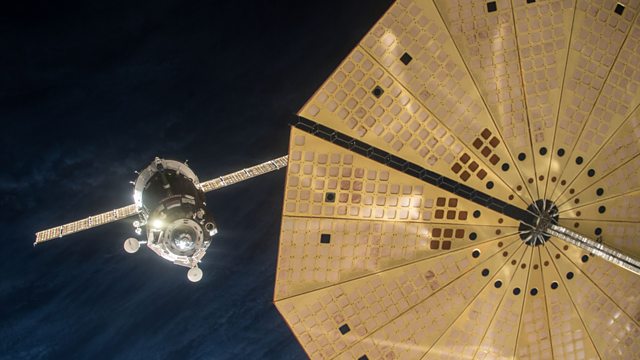
Life on the ISS
Life on the ISS; New Skinsuit Worn on the ISS; Mers; AGU; Enceladus; Modelling Mars in Antarctica; Closure
Many people in the UK were watching British astronaut, Flight Engineer Tim Peake of ESA, blast off for a six month mission to the International Space Station (ISS). The Soyuz successfully launched, and with a little bit of extra drama due to a manual docking, reached the ISS. Tim, together with Russian cosmonaut Yuri Malenchenko and Tim Kopra of Nasa, join the three team members already there, orbiting the Earth 16 times a day. To find out what life for them actually involves on a daily basis, Adam Rutherford spoke to Commander Chris Hadfield, a veteran of - two shuttle missions, 6 months on the ISS, and famously the man who played David Bowie covers from space.
New Skinsuit Worn on the ISS
In September the European Space Agency astronaut Andreas Mogensen became the first Dane in space when he went to the International Space Station (ISS). He was also the first to test a new skinsuit developed by scientists at King’s College in London. The skinsuit aims to protect astronauts from the harmful effects of microgravity, such as back problems experienced by some as a result of the body elongating by as much as seven centimetres in space. Tracey Logan meets Dr David A.Green, one of the developers of the suit, and Claudia Hammond talks to Andreas Mogensen about what it was like to wear it on the ISS.
Mers
A report in the journal Science suggests that an effective vaccine to protect against the Middle East respiratory virus is a step closer. It was able to protect camels, the animal reservoir for the virus, from developing Mers symptoms. Jonathan Ball, Professor of Molecular Virology at Nottingham University in the UK explains more.
American Geophysical Union
Jonathan Amos, ����ý Science Reporter, brings us the latest stories from the American Geophysical Union meeting in San Francisco, California. This is a huge event attended by scientists from all over the world – nearly 24 000 of them. Jonathan tells Jack Stewart about a new study of the recent Nepal earthquake, the impact of climate change on polar bears and the effects of sound on elephants.
Enceladus: A Second Genesis of Life at Saturn?
The most intriguing body in the solar system is Saturn’s moon Enceladus. It is a small icy world with gigantic geysers, blasting water into space at supersonic speeds. It has also become the most promising place among the planets to search for extra-terrestrial life. These astonishing discoveries come from Nasa’s Cassini mission to Saturn launched 18 years ago and still underway. The ����ý’s Jonathan Amos talks to scientists who have been at the centre of the unfolding story of Enceladus and to those who want to return to answer the great question which it poses.
Modelling Mars in Antarctica
One way of working out how people might cope both physically and psychologically on a trip to Mars, which would take about eight months each way, is to study humans who are isolated on earth - at one end of the earth to be precise. Alexander Kumar spent nine months as the doctor at the Antarctic station Concordia, which is so other worldly he calls it White Mars. The team there endured temperatures as low as minus 80 degrees and very low oxygen levels. For four long, dark months in winter no one could come and go and the team of twelve were completely reliant on each other. For the European Space Agency Dr Kumar conducted various physiological and psychology tests to see how his team mates were coping. He tells Claudia Hammond his findings.
Closure
Every day we are invited to sign up, to subscribe to new digital technologies, but it does not seem to be so easy to unsubscribe. Even when you get round to it, there seem to be myriad hurdles. Why is this so? Why are so many companies brilliant at signing you up but useless at letting you go? Colin Grant talks to the interactive designer and tech innovator, Joe McLeod about closure experiences.
(Photo caption: Expedition 46 Soyuz approaches space station for docking © Nasa)
The Science Hour was presented by Jack Stewart
Producers: Erika Wright and Fiona Roberts
Editor: Deborah Cohen
Last on
More episodes
Previous
Next
Broadcasts
- Sat 19 Dec 2015 09:06GMT����ý World Service Australasia
- Sat 19 Dec 2015 23:06GMT����ý World Service except News Internet
- Sun 20 Dec 2015 02:06GMT����ý World Service Australasia
- Sun 20 Dec 2015 11:06GMT����ý World Service except Australasia & News Internet
- Sun 20 Dec 2015 14:06GMT����ý World Service Australasia
- Mon 21 Dec 2015 06:06GMT����ý World Service South Asia
Podcast
-
![]()
Unexpected Elements
The news you know, the science you don't

